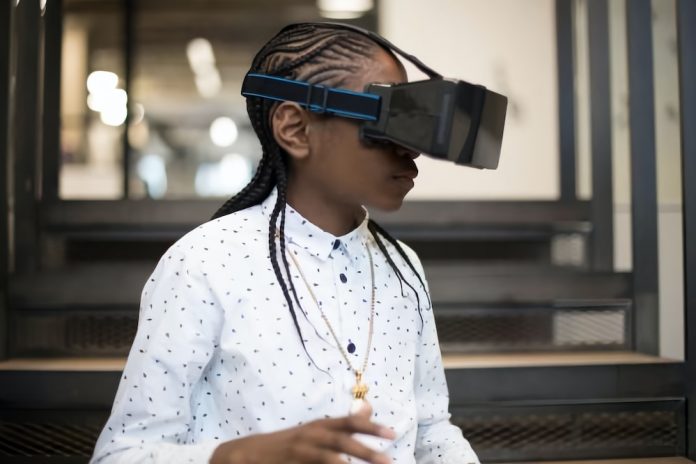The concept of metaverse was originally coined by science fiction writers and futurists. Visualising it as a joint space in a virtual world where people can simultaneously exist, communicate, and share immersive experiences without being physically close to each other. You may have seen more or less optimistic representations of the concept in such movies as ‘The Matrix’, ‘Ready Player One’, ‘Altered Carbon’, and ‘Tron’. While this idea was previously explored by such technology companies as Facebook as cautious attempts at new entertainment formats, there is a chance that it may become a reality in higher education much sooner than everyone expected.
In the fall of 2022, 10 US universities will open virtual campuses to their students who will have a first-hand opportunity to experience the metaverse using VR headsets and virtual classrooms. With the University of Maryland Global Campus planning to enrol 45,000+ learners who will never physically walk its halls, it is already evident that more and more institutions will choose to embrace this new format. In this article, we will explore whether the metaverse should really be implemented by higher education.
The Promise of Metaverse
There exists a combination of 5 highly practical reasons why the idea of a metaverse has become this popular in the early 2020s:
- Cheap VR Headsets
As opposed to the clumsy VR helmets of old costing thousands of US dollars. Modern solutions such as the Oculus Quest 2 can be purchased for as low as $400, which is mostly affordable for most students and educational institutions.
- Increasing Internet Speeds
The advancement of 5G networks and autonomous devices means that you can easily carry a small VR headset with you to any part of the world. You can learn from anywhere with minimal limitations.
- Remote Education During COVID-19
The experience of global lockdowns has substantially sped up the adoption of remote education ideas and demonstrated their effectiveness.
- Internationalisation of Education
Thousands of international students from all over the world had to return to their home countries and study remotely for many months. Many of them have raised questions about why they have to travel back physically. If educational services can be delivered via virtual technologies, learners from any region can have equal access to them without spending money on visas, expensive accommodation or plane tickets.
- First-Hand Experiences
With the first surgery being successfully performed in real time using 5G and VR in 2019, we must ask where our presence in physical rooms during university lectures would be any different from visiting them virtually. For students learning how to perform medical operations or learning soldering and welding techniques as engineers, being able to see everything ‘from the first-person perspective’ may actually boost the speed and quality of the educational process.
The main promise of the metaverse in education is the possibility of affording a high-quality education for thousands of learners worldwide. Especially if they are willing to embrace a shared virtual space. It also involves the introduction of new learning methods such as the ‘first-person perspective’ or the capability to visualise any process from the functioning of human organs to complex machinery operations while being guided by competent supervisors.
The Challenges of Metaverse
As of 2022, most of the aforementioned ideas have not been implemented yet. While we still have not observed the practical results of these large-scale experiments, the experiences shared by enthusiast gamers indicate a number of potential challenges associated with the metaverse concept:
- It is not clear how an educational metaverse should be organised. Current technologies usually offer standardised virtual halls with students’ ‘avatars’ being shown as primitive 3d models. It is not clear how this format will facilitate interactions as opposed to Zoom conferences used in remote education now.
- The use of relatively primitive visualisation implies that the identity of individual participants may be difficult to verify. While video calls demonstrate real students, virtual rooms potentially open some possibilities for wrongful use or theft of accounts and all sorts of inappropriate behaviours. This may be seen as a cybersecurity threat that has not been thoroughly explored yet.
- The implementation of a metaverse in higher education is associated with substantial skill requirements that must be possessed by all involved stakeholders. On the one hand, the developers of such systems must create secure virtual spaces supporting multiple VR devices. Whilst allowing students from any part of the world to join shared classrooms and engage in learning processes.
This may be seen as a major technological challenge since no standardised solutions are presently available in the market. On the other hand, students and teachers have to learn how to use these systems effectively and adjust to the new status quo.
Implementation Potential
The analysis above suggests that the concept of a metaverse in education offers a wide variety of benefits for practitioners in terms of both commercial potential and new educational methods. Its implementation by some of the leading universities in the US suggests that it may become a viable alternative to traditional learning schemes by the end of the 2030s. However, the absence of standardised existing solutions and existing financial and technological barriers may stop most institutions from fully embracing this concept at the moment.
If your university is willing to keep up with the cutting edge of modern educational methods, you may experiment with metaverse ideas within some subjects of the curriculum or within some selected groups of students. This will prepare you for large-scale implementation in the future and will give you a first-hand experience of this technology and the practical benefits it can offer to your institution.
Author Bio
Ellie Richards is an online Marketing Manager for Original PhD, specialising in PhD thesis writing. She is passionate about researching and writing on various topics, including Education, Marketing, and Technology.






